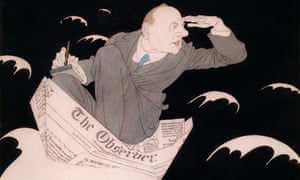
The first edition of the Observer made the ringing declaration that the newspaper would be “Unbiaffed by Prejudice – Uninfluenced by Party, Whofe Principle is Independence – whofe Object is Truth”. A fine set of principles and it would be lovely to be able to say that the Observer has always kept that promise. Lovely, but a lie of Trumpian proportions. The paper was still in its infancy when it ran out of money and the owners struck a grubby deal with the government, not untypical of the 18th century, which gave the title a subsidy in return for influence over its content. When Viscount Palmerston was prime minister, he made clandestine payments from secret service funds, which bought him the privilege of penning opinion pieces in praise of himself.
Yet here’s the thing. Reviewing the positions the paper has taken over its long life, it has been a champion of liberalism __more often than not. Under a wild variety of owners, among them the rackety and the reactionary, the Observer has broadly been a friend of enlightenment. On the big questions, it has sometimes chosen the wrong side of history, but __more often been a beacon for truth, justice and progress.
In the 19th century, the paper gave a lot more attention than many of its competitors to reporting the Chartist movement and the campaign for universal suffrage. As Stephen Pritchard’s superb history of the paper also records, the Observer struck an enduring blow for freedom during the murky Cato Street affair in 1820. A group of men were accused of conspiring to assassinate ministers and the government sought to gag any coverage of the trial. Defying a court order and suffering a massive fine to report the case, the paper established the vital principle that justice cannot take place in the dark.
When America began its descent into civil war in January 1861, much of the British press and political opinion favoured the secession of the southern slave states. Not so the Observer: “All the attempts at compromise have failed because the south was bent on making demands which the north could not in honour or justice comply with. Not the least important of these was the desire to re-open the African slave trade – a nefarious commerce.”
A leader from October 1861, entitled The Moral Issue, was even more emphatic, though some of its language sounds very archaic today. “All our sympathies are necessarily with the North. We should deplore, in common with all friends of humanity, the result of any struggle, long or short, that would end in leaving four million of our dusky brothers in hopeless and confirmed servitude.” The paper reacted to the “unparalleled and bloody outrage” of Lincoln’s assassination in 1865 by urging a continuation of “the conciliating temper, moderation and firmness which he has exhibited”.
Something very strange happened in 1901. The Observer was acquired by Lord Northcliffe and thus became a sister title of the Daily Mail. The Conservative press baron then gave the editorship to a high Tory, James Louis – always JL in the paper – Garvin. During more than three decades at the helm, he often steered the paper into un-Tory positions. The Observer gave its broad backing to David Lloyd George as he laid the foundations of the welfare state. The paper hailed the introduction of national insurance as “the greatest scheme of social reconstruction ever yet attempted”.
One of the Observer’s most admirable traits has been to speak truth to power, and to its readers – however unpopular that might sometimes be with both. At the end of the first world war, the paper was a rare and prescient voice opposing the Treaty of Versailles. Garvin wrote a prophetic editorial entitled Peace and Dragons Teeth, which warned that the treaty was so punitive to the Germans that it left them “no real hope, except in revenge”. Garvin’s Observer was more typical of its times when it was slow to grasp the magnitude of the threat posed by the Nazis. He opined in 1934: “That Herr Hitler will declare for reason and stability against extremism and convulsions there seems little doubt.” When Neville Chamberlain came back from Munich with his notorious “piece of paper”, the appeasing deal with Hitler was lauded as a “masterstroke”. Once Britain was at war, Garvin somewhat redeemed himself by giving unwavering support to Churchill.
It was from the 1940s, under the editorship-ownership of David Astor, that the paper became the leading liberal voice in postwar Britain. Writing at the end of 27 years in the chair, he modestly declared that his greatest skill was “talent-spotting”, explaining: “Writing talent will always be as rare as gold.” He recruited writers of the highest carat, among them George Orwell who was contributing to the paper long before he was famous. In the vanguard of the push for social reform, which began in the late 1950s, the paper was a powerful advocate for an end to the criminalisation of homosexuality, for racial equality, and for the abolition of the death penalty. Arthur Koestler launched the campaign to stop capital punishment by declaring: “Great Britain is that peculiar country in Europe where people drive on the left side of the road, measure in inches and yards, and hang people by the neck until they are dead.”

The Observer was the most vigorous champion in the British press of Nelson Mandela and the struggle against apartheid South Africa, and at the forefront of the drive to establish Amnesty International. The defining event of Astor’s time was his response to Anthony Eden’s misadventure in the Middle East in 1956. The Anglo-French invasion of Egypt to seize the Suez canal was initially greeted with a widespread patriotic fervour that required considerable courage to oppose. The Observer was the first national newspaper to fully grasp how duplicitous Eden had been and spelled it out in the most trenchant language. “We had not realised that our government was capable of such folly and such crookedness,” declared the leader, which came to be regarded as one of the most influential of the 20th century. It went on: “In the eyes of the whole world, the British and the French have acted not as policemen, but as gangsters.”
Senior Tories first denounced the paper and then took its advice that “Sir Anthony Eden must go”.
In his excellent biography of Astor, Jeremy Lewis contends that it is a myth that the Observer lost sales as a result of its bold and vindicated opposition to Suez. The financial damage was done by an advertising boycott of the paper by several large companies whose furious owners felt the Observer had let down Britain or abandoned Israel, even though the paper had backed the country since its birth.
Being honest, as that founding promise urges us to be, readers have not always liked positions that the paper has taken in recent years. There was anger about support for the invasion of Iraq to remove the dictatorship of Saddam Hussein. It is fair to say that recommending the Liberal Democrats at the 2010 election did not receive unanimous acclaim when they then went into coalition with the Conservatives. Sometimes, to the consternation of our writers, the world does not always take the advice offered in the paper’s leaders and opinion columns. Donald Trump was not our choice to be president of the United States and we didn’t want Britain to vote to amputate itself from the European Union. The second decade of the 21st century finds liberalism and internationalism under siege from many menacing directions. The rise of “fake news” and the nihilistic rejection of the very concept of expert opinion makes the environment even more challenging. Which also means that it has never been more essential to try to do our imperfect best to keep that original promise to seek out the truth and try to tell it. Unbiased by prejudice – Uninfluenced by party.